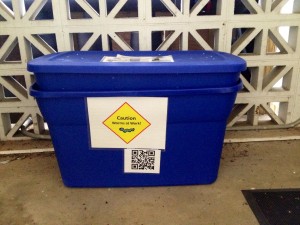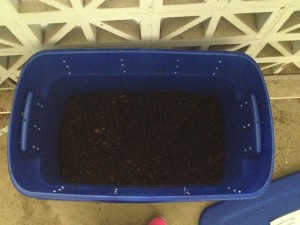Caution…Worms at Work!
Many home gardeners may have thought about composting, but may not have the time, the space or, let’s face it, the patience. Well then vermicomposting is ideal to satisfy those conditions! Vermicomposting is the process of using worms and micro-organisms to turn food waste into a nutrient-rich compost called worm castings. Worm composting bins can take up less space than traditional composting bins and can even be kept inside.
Bins can be purchased or made at home, for those who want to compost on a budget. If the home gardener is planning on making their own there are a few things that should be considered. Make sure that the container won’t absorb too much water (such as cardboard), because worms need to stay moist. The container should also be made of a non-clear material. A good example would be 1-18 gallon plastic (not clear) container or a Styrofoam container with a lid. Holes need to be drilled about 4 inches from the top of the bin. Covering the air holes with a type of screen is a good idea to prevent the escape of the composters.
After the bin has been constructed bedding (shredded newspaper, etc.) will need to be placed at the bottom. The bedding should be moistened and then potting soil added on top of that. This will provide a good living habitat for your worms. The Number of worms that need to be added will depend on the container size. When getting worms, make sure to use red wigglers (Eisenia fetida) or African Nightcrawlers (Eudrilus eugeniae). Unlike earthworms found in the garden, these worms thrive in composting bin conditions. They can usually be found at bait stores or local worm farms.
Now its time to put them to work! Worms can be fed daily or weekly. One pound of worms can be fed about half a pound of kitchen scraps per day. When adding scraps avoid using animals products like eggs, cheese or meat. The ideal meal should include small scraps of vegetables, fruits, coffee grounds, bread and paper. When adding the scraps be sure to bury them under the soil. Store the worm bin in an area that does not receive direct sunlight and stays at a constant temperature of about 60 to 80 degrees. Be sure to have a lid for your container, this will keep light out and will also help prevent the appearance of flies. One pound of worms can turn 65 pounds of garbage into garden compost in about 110 days. Compost should be harvestable in a matter of months!
Vermicomposting is a great way to compost for those living in an apartment or those that have kitchen scraps as a main source of compost materials. Worm castings are used just like normal compost. Add them to plants and gardens as a soil amendment, use them in potting soil, or make a compost tea.
For more information contact your local UF/IFAS Extension Office.
- Reference Books for Gardeners and Landscapers Alike - August 3, 2015
- The Danger Within… What’s Hiding in Our Woods - June 15, 2015
- What To Do with All This Rain? Plant a Rain Garden! - April 14, 2015


